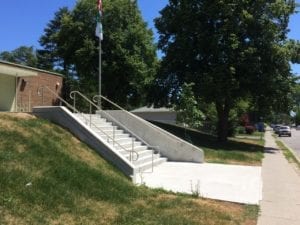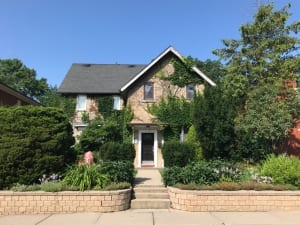How to set up a local history website; some notes about starting neighbourhood associations; value of letter-writing efforts; plus notes on committee of adjustment meetings
I live in Stratford and continue to be closely involved with local history and land use topics in Toronto and Mississauga. I’m also getting up to speed on local history and resources in Stratford.
I wrote a post on May 8, 2017 dealing with the content of the current post. I’m rewriting it now with revisions and additions.
I strongly encourage younger residents of Ontario to consider setting up a website, such as mine, so that we as residents will share information as years go by.
I would be pleased to work with any resident who might have an interest in setting up a website similar to mine.
I would be pleased to share what I have learned in recent years about web design and everything else.
My purpose in writing this post is to say that if you have an interest in blogging, I encourage you to get started now.
The most important thing is to get started. That’s the big step, from which all else follows.
Blogging
Working at this site in recent years has been a tremendously valuable learning experience for me.
I’ve been really lucky in being able to find good web designers to work with. That has been a key ingredient, in getting the site up and running in the first place.
I spent a lot of time preparing the site – working on the page design and site navigation – before it was launched. That was time well spent.
Division of labour is helpful
Writing evidence-based blog posts and opinion articles requires a great deal of time and effort, in my experience. That being the case, I would recommend that, for community groups, a division of labour makes good sense.
By way of example, in many cases it may be better to have some residents focusing energy on taking part in committee of adjustment and similar hearings, and some focusing on succinct, well-written blog posts and articles related to such hearings.
Given the time and energy that is required for any form of community-based volunteer work, it is better for the work to be spread out as widely as possible.
Some other things that come to mind:
I’ve found it useful to have some background in news reporting and feature writing, including working to deadline and within specified length-of-text parameters
It’s absolutely essential to take great care by way of corroborating and verifying what gets published
Early in my writing career, I learned a lot from working with editors and writers with a track record for first-rate work
Having people comment on early drafts, and having an experienced and capable editor go over drafts with you, pointing out how certain things can be done better, can be a great learning experience
Early in my writing career, an editor taught me how to say in a sentence or two what I had been taking several pages of double-spaced text to say
If there are factual errors in anything that I post, which has occurred on rare occasions, I much appreciate learning about them, and I make corrections at once
It’s useful to have some understanding of what evidence, and evidence-based practice, entails
Human agency
Human agency takes many forms; for residents, in particular, persistence in fact-sharing is likely to have more impact than endlessly sounding off
We can say this another way: Human agency involves getting results; strategic planning and strategic thinking matter hugely, because they ensure that we achieve practical, measurable results – which stand in strong contrast to endlessly sounding off and getting nowhere
Through blogging, and attending meetings and following stories, as well as through extensive reading about history and other topics, I’ve learned many new things, including new ways of looking at events and trends – such ongoing learning is among the many potential rewards of blogging
I make it a point to take care to respect people’s privacy; for example, I get permission first, before I post, to my website, email messages (or direct quotes from them) and photos that are sent to me
In newspaper and magazine writing, as with texts at my own website, shorter paragraphs generally appear to work better than very long ones.
Sometimes, in order to more quickly and effectively gain understanding of a long journal article, that I’m reading offline, I convert it from a PDF file into text in Microsoft Word, and then break the longer paragraphs into shorter ones.
Such a procedure speeds up my comprehension tremendously. From my perspective the convention, in much of academic writing, of cramming enormous amounts of words into single paragraphs sharply impedes reading comprehension.
An additional topic, with regard to community-oriented websites, concerns the avoidance of libel and defamation lawsuits
With regard to the latter point, an excerpt from the link in the previous sentence reads:
Based on what I have observed over the years, I strongly recommend that all communications from residents – written as well as spoken messages – be at all times strongly evidence-based, devoid of personal attacks of any kind, and expressed in language that is cordial, moderate in tone, and businesslike. Things can be stated directly, and with passion, while keeping within the parameters that I have outlined.
For residents associations or community groups, liability insurance, to address potential expenses associated with the hiring of legal counsel, in the event of defamation lawsuits that may be directed your way as a way to limit public participation, is also highly recommended.
Additional things I’ve learned about writing and community self-organizing are outlined at other posts
An earlier post addresses additional things that I’ve learned, through practical experience, about writing:
Enthusiasm for local history is not enough, by itself, to preserve and repurpose heritage buildings

View of new main entrance stairs, one of many new, recently constructed landscape features at École élémentaire Micheline-Saint-Cyr, 85 Forty First St. in Long Branch. Jaan Pill photo.
Well-organized letter-writing efforts can be highly effective
Two case studies: Well-done letter-writing efforts
Parkview School (École élémentaire Micheline-Saint-Cyr)
Links to four posts regarding the two case studies follow below:
The text for the 2011 Parkview School letter was developed with input from many sources
58 Wheatfield Road, Mimico
58 Wheatfield Road in Mimico has now been designated under the Ontario Heritage Act
Neighbourhood associations
Some other posts that may be of value include:
Some observations regarding the starting and running of neighbourhood associations
Neighbourhood associations work best when membership is inclusive; renters should always be included
How to prepare for a committee of adjustment meeting
Committee of Adjustment and Toronto Local Appeal Body (and similar appeal boards elsewhere)
How to organize a high school reunion
How to start a self-help group
How to start a self-help group
The above-noted post from 2012 outlines how I got started with community self-organizing in the first place. We all have formative experiences that launch us on a particular pathway in life. Each person will have their own way to make a start of things.
The above-mentioned post describes how my own journey began. It was something I fell into. It represents one person’s way of learning about the value of community self-organizing.
Getting started, and then sticking with the tasks at hand, working together with like-minded people. That’s what matters.


Leave a Reply
Want to join the discussion?Feel free to contribute!